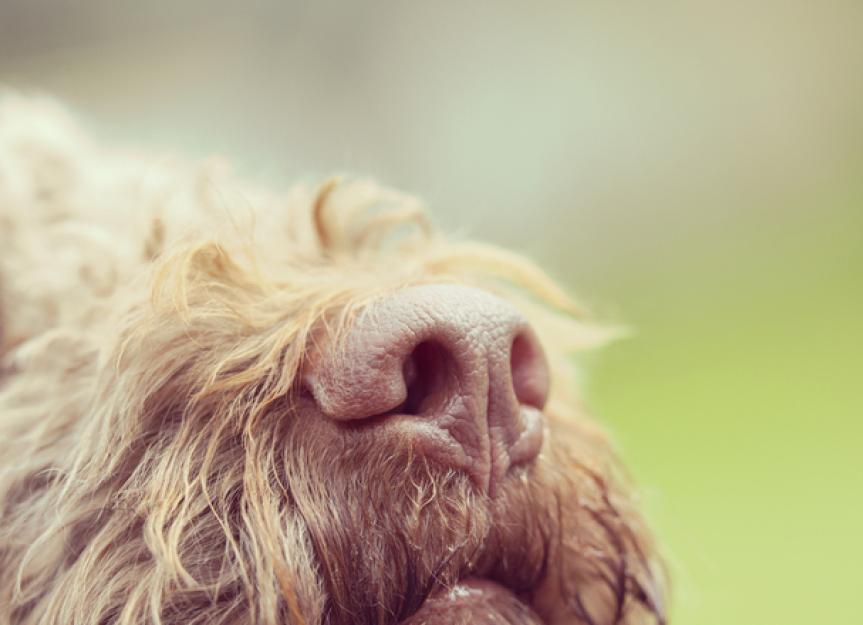Why Is My Dog’s Nose Running?
By: Nicole Pajer
你有没有注意到你的狗是流鼻涕,我ndered if it was something to be concerned about? From allergies to infections, dogs’ noses run for a variety of reasons. Some are serious, while others are not. Learn more about causes of nasal discharge in canines, what to do about it and when to be concerned.
What Causes Nasal Discharge in Dogs?
As in humans, there are a variety of reasons why a dog’s nose might run, including irritants, allergies and infections.
“Since canines are low to the ground and explore with their nose, they tend to inhale things that we don't typically get exposed to walking at our level,” says Dr. Stephanie Liff of Pure Paws Veterinary Clinic. “Over time, some of these things can irritate their nasal cavities and cause a runny nose.”
Dust, smoke, incense, perfume and cleaning products, are among the types of environmental irritants that can cause nasal discharge. Allergies to pollen, mold, etc. may also be to blame. In general, however, upper respiratory infections and over activity are among the most common reasons a dog’s nose will run.
“Viral and bacterial infections often occur together as a part of Canine Infectious Respiratory Disease Complex [or kennel cough],” says Dr. Morgan Tannenbaum of Regency Veterinary Clinic in Boca Raton, Florida. Symptoms of these upper respiratory infections often include nasal discharge. They are also considered contagious, he says, so infected dogs should be isolated for two or more weeks.
A less serious type of nasal discharge develops because dogs cannot regulate their body temperature through their skin like people. Instead, they secrete sweat from the pads of their feet and their noses to cool down, says Dr. Jenna Sansolo of Ardsley Veterinary Associates.
“When a human becomes over heated our bodies begin to sweat. Dogs don't have this function. Instead, they secrete sweat from the pads on their feet and their noses,” she says, adding that this is the most common reason why humans will notice increased clear fluid on their dogs’ noses.
More Serious Causes of Nasal Discharge
Foreign bodies, toxins, dental problems, blood-clotting disorders, and tumors may also be the cause of your dog’s runny nose.
“When a dog inhales any foreign matter (e.g., a foxtail through the nose), it can cause a problem,” says Dr. Jeff Werber, a veterinarian in Los Angeles, California. “[The] body will reject the foreign body, and this can lead to an infection in the nose. It can cause the nose to run and also cause bleeding,”
Ingesting toxic materials can also be a cause of nasal discharge in dogs.
“If a pet consumes an anticoagulant rodenticide like brodifacoum, which inhibits the body’s normal blood clotting cascade, hemorrhagic nasal discharge can occur,” says Dr. Patrick Mahaney of California Pet Acupuncture and Wellness, Inc.
“Tooth root abscesses in the [upper] teeth can cause nasal discharge because of the proximity between tooth roots and the nasal passages,” adds Mahaney. He also says that certain blood-clotting disorders can cause nasal discharge that appears pink or light to dark red in color.
“If the discharge is bloody, that could also mean a tumor or polyp is present, which can be serious,” Werber adds.
How to Treat Your Dog’s Runny Nose
If your dog’s nasal discharge is clear and watery and if your pet is acting fine (eating well, not coughing, etc.), then Werber says there is no need to panic.
As a general rule of thumb, Sansolo says to be on the lookout for drainage that is not clear, such as white, yellow, green or bloody discharge.
“If the nose is bleeding, you should hold a tissue, soft cloth, or even a towel to the nose, and hold the head back to try and control the bleeding and get to your veterinarian or an emergency facility as soon as possible,” Werber says.
Normal, clear discharge will most likely dissipate on its own, Sansolo says, however, it is important to pay attention to your pet’s individual symptoms and seek veterinary attention when appropriate.
“狗是不同的,就像每个人一样,“she says. “Whenever you notice something out of the ordinary for your dog it is never wrong to have your veterinarian take a look.”
Help us make PetMD better
Was this article helpful?
